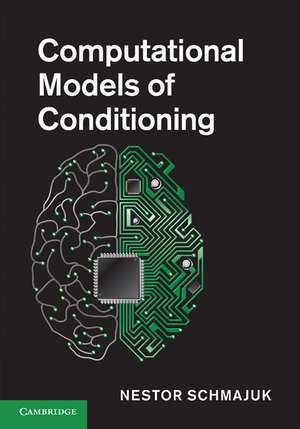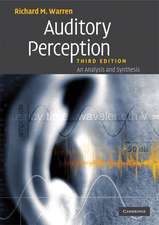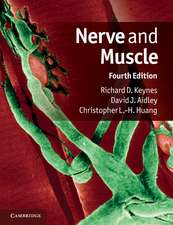Computational Models of Conditioning
Autor Nestor Schmajuken Limba Engleză Hardback – 20 oct 2010
Preț: 578.73 lei
Preț vechi: 650.25 lei
-11% Nou
Puncte Express: 868
Preț estimativ în valută:
110.74€ • 115.86$ • 91.99£
110.74€ • 115.86$ • 91.99£
Carte tipărită la comandă
Livrare economică 02-16 aprilie
Preluare comenzi: 021 569.72.76
Specificații
ISBN-13: 9780521113649
ISBN-10: 0521113644
Pagini: 284
Ilustrații: 74 b/w illus. 15 tables
Dimensiuni: 178 x 253 x 13 mm
Greutate: 0.72 kg
Editura: Cambridge University Press
Colecția Cambridge University Press
Locul publicării:Cambridge, United Kingdom
ISBN-10: 0521113644
Pagini: 284
Ilustrații: 74 b/w illus. 15 tables
Dimensiuni: 178 x 253 x 13 mm
Greutate: 0.72 kg
Editura: Cambridge University Press
Colecția Cambridge University Press
Locul publicării:Cambridge, United Kingdom
Cuprins
Introduction; 1. Evolution of attention in learning John K. Kruschke and Richard A. Hullinger; 2. The arguments of associations Justin A. Harris; 3. The hybrid modeling approach to conditioning Michael E. Le Pelley; 4. Within-compound associations: models and data James E. Witnauer and Ralph R. Miller; 5. Associative modulation of US processing: implications for understanding of habituation Allan R. Wagner and Edgar H. Vogel; 6. Attention, associations, and configurations in conditioning Nestor A. Schmajuk, Munir G. Kutlu, Joseph Dunsmoor and José A. Larrauri; 7. Computer simulation of the cerebellum Michael D. Mauk; 8. Towards a neural-network interpretation of the operant-respondent distinction José E. Burgos; Index.
Notă biografică
Descriere
Presents the latest advancements in the field of computational models of conditioning and some of their physiological bases.









